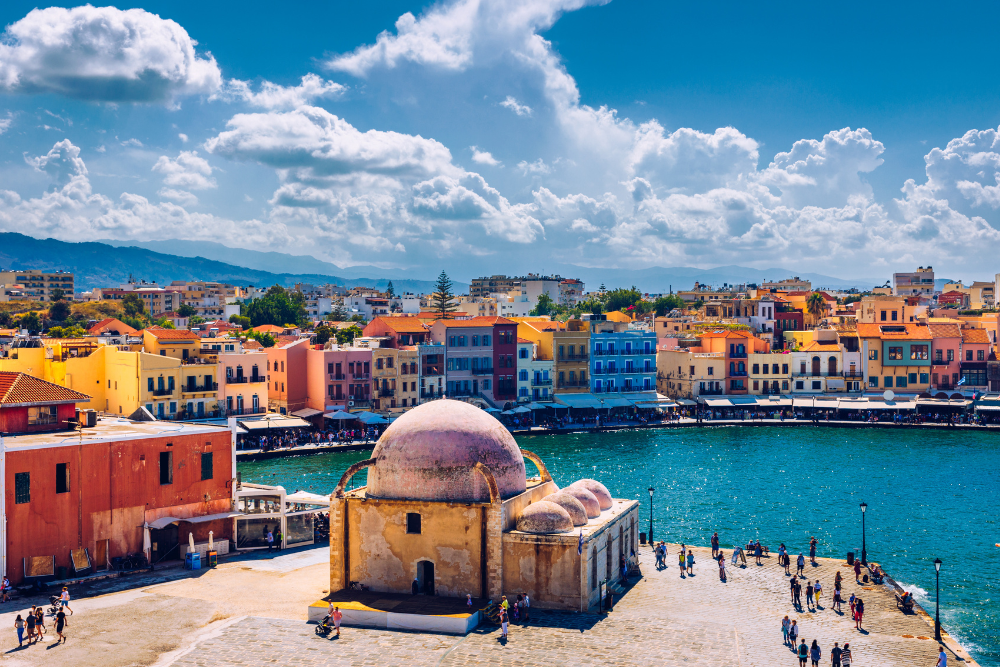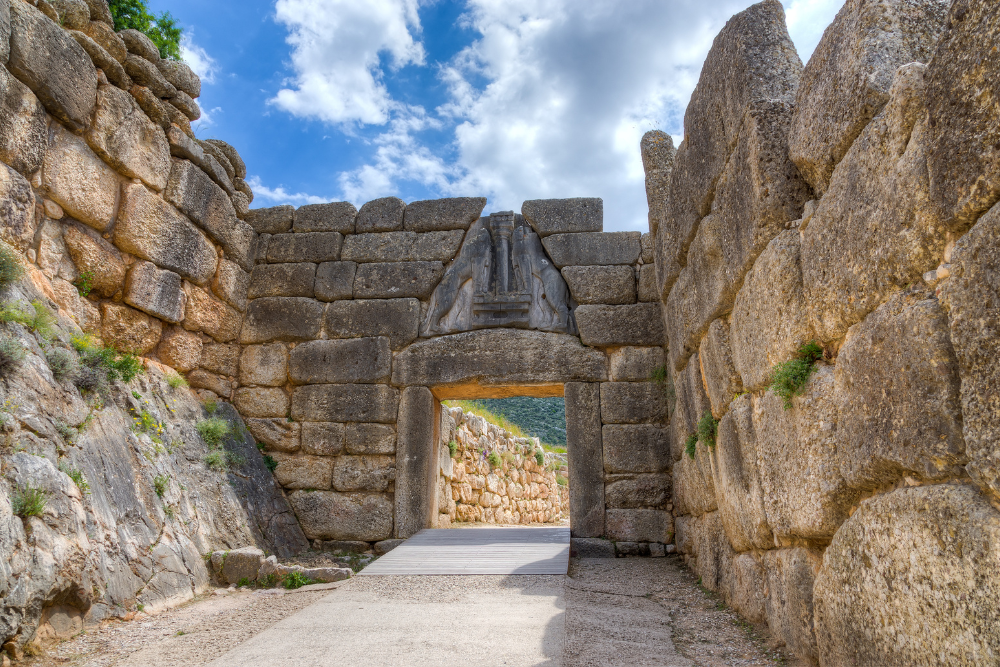Greece is a country rich in history, where every island offers a unique glimpse into the ancient world. For history enthusiasts, the Greek islands provide not only breathtaking views but also a treasure trove of ancient ruins, archaeological sites, and stories that have shaped modern civilization. Whether you’re drawn to ancient temples, Venetian castles, or prehistoric settlements, the islands of Greece offer countless opportunities to immerse yourself in history. Here’s a guide to the best Greek islands for history buffs, where ancient ruins meet fascinating stories and legendary landmarks.
1. Crete: The Cradle of Western Civilization

As the largest of the Greek islands, Crete is an essential destination for any history buff. The island is home to one of Europe’s oldest and most advanced civilizations, the Minoans, who thrived here around 2000 BC. Knossos, the Minoan palace near Heraklion, is the island’s most famous archaeological site. This ancient palace complex was the seat of King Minos and is filled with intricate frescoes, labyrinthine corridors, and remnants of the Minoan civilization that continue to intrigue historians.
In addition to Knossos, Crete offers numerous ancient ruins, such as the Palace of Phaistos, Gortyna, and Spinalonga Island, a former leper colony that offers a glimpse into the more recent history of the island. Crete’s rugged landscape is dotted with medieval Venetian castles, Byzantine churches, and ancient Roman ruins, making it a perfect destination for anyone interested in the evolution of Greek history through the centuries.
2. Rhodes: A Medieval Masterpiece
Rhodes, known for its medieval charm and ancient ruins, is a must-visit for history lovers. The island’s rich past spans from the ancient Greeks to the Knights of St. John, leaving a fascinating collection of historical landmarks. The Acropolis of Lindos, one of the most impressive ancient sites on the island, offers ruins of a temple dedicated to Athena, along with panoramic views of the sea and surrounding areas.
But Rhodes is also renowned for its medieval Old Town, a UNESCO World Heritage site. The Palace of the Grand Master is a magnificent fortress and former residence of the Knights of St. John, while the Street of the Knights remains one of the best-preserved medieval streets in Europe. The island’s strategic position in the eastern Mediterranean has shaped its diverse history, making Rhodes an essential stop for anyone interested in ancient civilizations and the medieval period.
3. Delos: The Sacred Island of Apollo
For a truly unique historical experience, head to Delos, a small island located near Mykonos. Delos is one of the most important archaeological sites in Greece and was once a major religious and cultural center. It is said to be the birthplace of Apollo and Artemis, making it a sacred site for ancient Greeks. Today, Delos is an open-air museum, with extensive ruins from the ancient Greek and Roman periods.
Highlights of the island include the Temple of Apollo, the Terrace of the Lions, and the ancient marketplace. Visitors can walk among ancient columns, mosaics, and remnants of temples that have withstood the test of time. Since Delos is uninhabited, it offers an almost mystical atmosphere, allowing you to immerse yourself fully in its history.
4. Naxos: Ancient Temples and Venetian Castles

Naxos, the largest island in the Cyclades, offers a wonderful mix of ancient ruins, Venetian architecture, and traditional Greek life. The island is known for the Temple of Apollo, or the Portara, a giant marble doorway that is all that remains of a temple dedicated to the god. This striking monument stands on a small islet and offers a stunning view of the sunset.
Naxos is also home to ancient archaeological sites like the Demeter Temple in Sangri, which dates back to the 6th century BC, and Kastro, a Venetian fortress in the heart of Naxos Town. The island’s rich history extends beyond ancient ruins, as it was also a major center for Venetian influence during the Middle Ages. Naxos offers an intriguing blend of ancient history and medieval architecture, making it a fascinating destination for history buffs.
5. Kos: From the Ancient Greeks to the Romans
Kos, an island with a rich ancient and medieval history, is another excellent destination for history enthusiasts. The island was a thriving center of ancient Greek culture and is the birthplace of Hippocrates, the father of medicine. One of the island’s top historical attractions is the Asclepius Sanctuary, an ancient healing center dedicated to the god of medicine, Asclepius. The sanctuary contains the ruins of temples, baths, and other structures, offering a fascinating look into the medical practices of ancient Greece.
Kos is also home to Ancient Agora, the site of the ancient marketplace, and the Castle of the Knights, which showcases the island’s medieval past. With its blend of ancient Greek, Roman, and medieval sites, Kos provides a diverse and fascinating historical journey.
6. Patmos: The Island of Revelation
For those interested in Christian history, Patmos is a unique island with deep religious significance. Known as the Island of the Apocalypse, Patmos is where the apostle John is said to have received the visions that led to the writing of the Book of Revelation. The Monastery of St. John the Theologian is one of the most important pilgrimage sites for Orthodox Christians, and its historical and religious significance is still felt across the island today.
The monastery, which dates back to the 11th century, is a UNESCO World Heritage site and offers stunning views of the island and surrounding sea. The Cave of the Apocalypse, where John is believed to have received his divine revelations, is also a must-visit site on the island. Patmos’ serene and spiritual atmosphere makes it an excellent destination for those interested in both religious and cultural history.
7. Mycenae (Argolis): The Home of King Agamemnon

Located on the mainland but easily accessible from the nearby island of Spetses, Mycenae is an ancient archaeological site that will fascinate any history lover. This once-mighty city, dating back to the 2nd millennium BC, is famously associated with King Agamemnon of Homeric legend. Mycenae was one of the most important centers of Greek civilization in the Late Bronze Age.
Highlights of the site include the Lion Gate, the Treasury of Atreus, and the royal tombs. The Archaeological Museum of Mycenae houses many of the artifacts discovered on-site, offering a deeper understanding of the Mycenaean civilization. The site’s rich history and connection to Greek mythology make it one of the most fascinating destinations for history buffs.
8. Ithaca: The Legendary Home of Odysseus
For lovers of Greek mythology and epic tales, Ithaca is a must-visit destination. Famous as the home of Odysseus, the hero of Homer’s Odyssey, Ithaca is a small, rugged island steeped in myth and history. While the island doesn’t boast as many ancient ruins as other Greek islands, its historical and cultural significance is immense.
Visitors can explore the island’s charming villages, ancient sites such as the Cave of the Nymphs (linked to the legend of Odysseus), and the Ancient Alalcomenae site, said to be the legendary town of the hero’s father. Ithaca’s connection to the ancient Greek epic, combined with its peaceful atmosphere, makes it an ideal spot for history buffs seeking both mythological intrigue and natural beauty.
9. Samos: A Blend of Ancient Greek and Roman Ruins
Samos, located in the northeastern Aegean Sea, is one of the most historically significant islands in Greece. Known for being the birthplace of the mathematician Pythagoras and the philosopher Epicurus, Samos is home to numerous archaeological sites, such as the Temple of Hera, one of the largest temples of the ancient world. The temple’s ruins provide a stunning insight into the grandeur of ancient Greek religious architecture.
Additionally, the Heraion of Samos, a large sanctuary dedicated to the goddess Hera, and the Archaeological Museum of Vathy, which houses artifacts from the ancient Greek and Roman periods, offer rich historical insights. Samos is perfect for history lovers looking to explore both ancient and Roman ruins while enjoying the island’s beautiful beaches and landscapes.
Conclusion
The Greek islands are a history lover’s paradise, offering a diverse range of ancient ruins, archaeological sites, and cultural landmarks. From the Minoan palaces of Crete to the medieval castles of Rhodes and the sacred island of Delos, there is no shortage of fascinating destinations to explore. Whether you’re walking through the ruins of ancient civilizations or discovering the hidden stories of myth and legend, Greece’s islands are sure to captivate any history buff.












